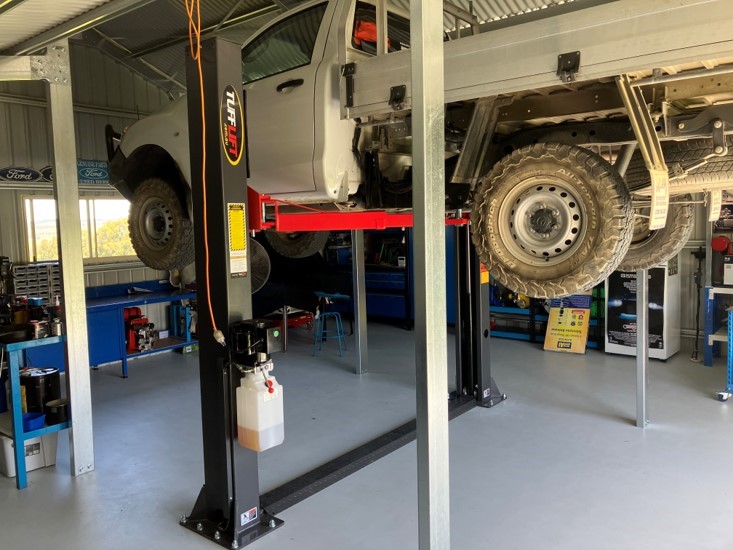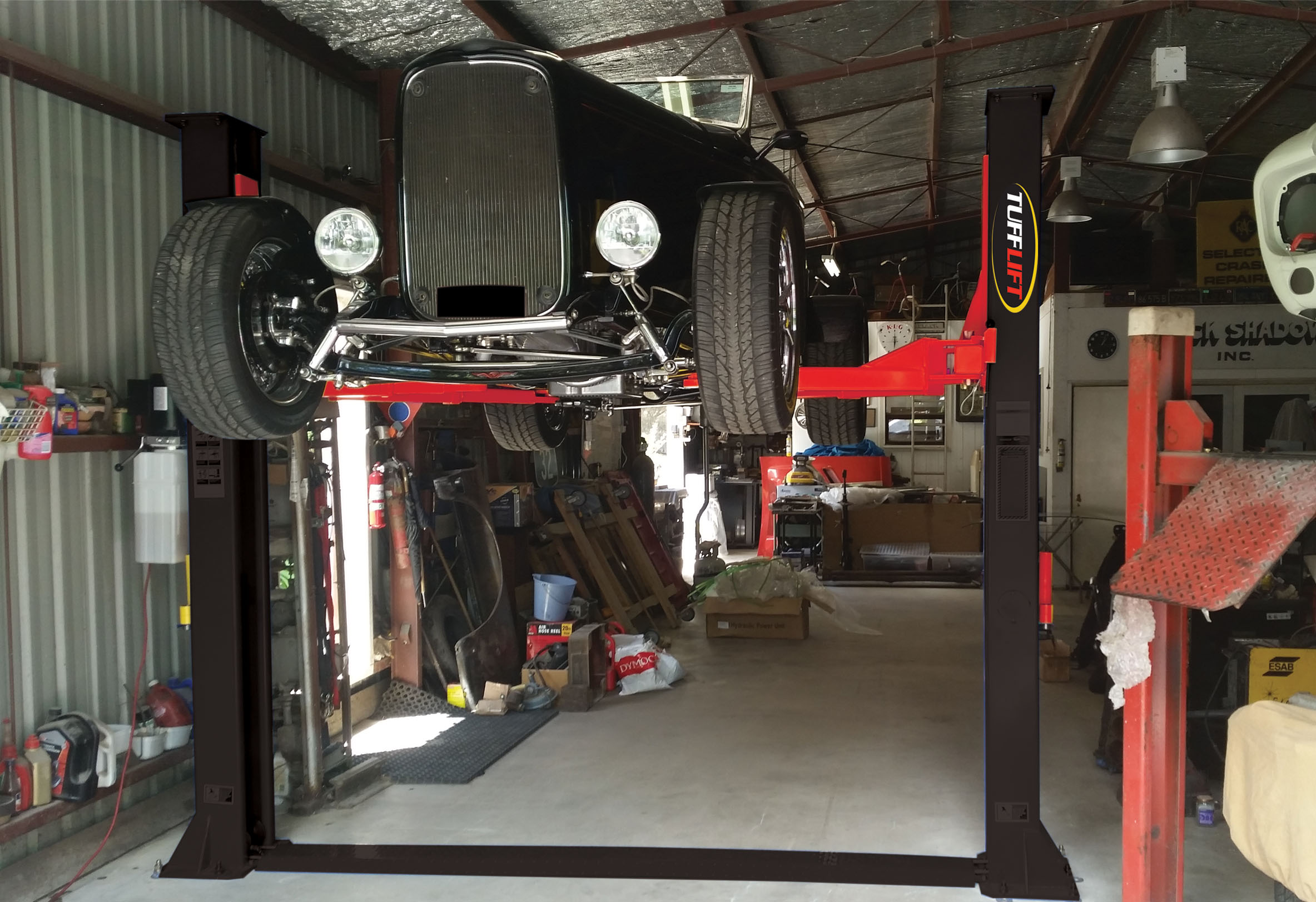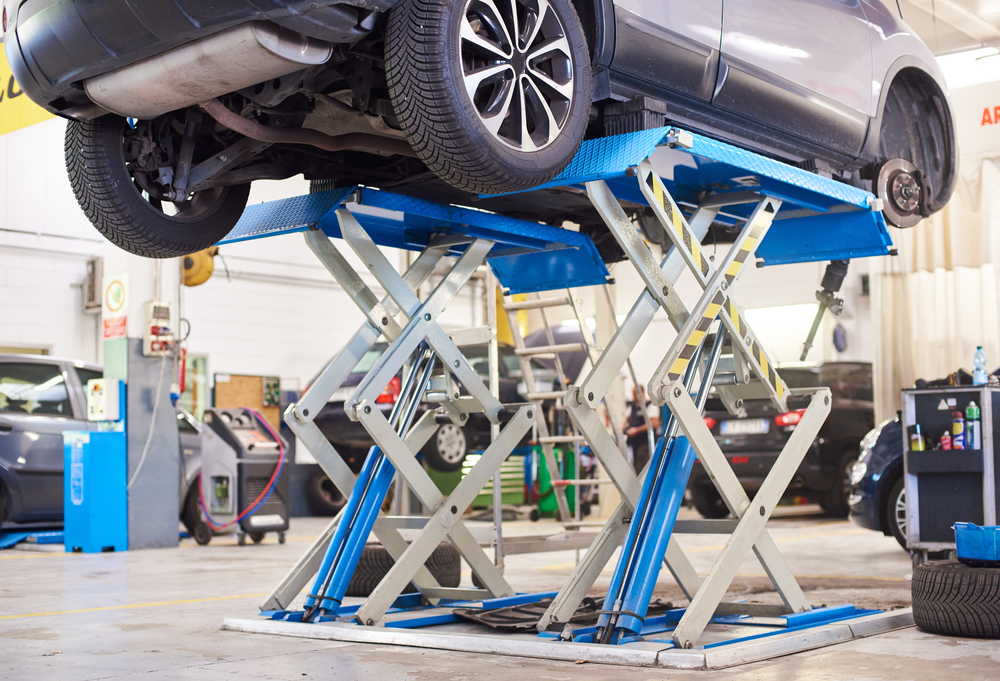A car hoist can be a valuable investment for any garage or auto shop.
Not only does it allow you to lift your car off the ground for repairs and maintenance, but it also makes it easier to access certain parts of the vehicle.
However, selecting the right car hoist can be challenging, with many available options.
This blog post will guide you through all the factors to consider before purchasing a car hoist.
Benefits of Owning a Car Hoist
Owning a car hoist can be a game-changer for vehicle maintenance and repair work if you’re an avid car enthusiast or mechanic.
A hoist provides an easier way to inspect and fix your vehicle’s undercarriage, and it can also help you save time and work more efficiently.
Instead of struggling on the ground, you can elevate your vehicle to a comfortable height where you can work with ease. Plus, with less strain on your back and knees, you’ll reduce the risk of injury and be able to work longer without any discomfort.
A car hoist is a valuable investment that can make car maintenance more organised, efficient, and enjoyable.
Types of Hoists Available on the Market
With several hoist types available on the market, choosing the best one that suits your needs can be challenging. Let’s look at some of the most common hoists available on the market and help you understand their differences to make an informed decision.
2 Post Car Hoists
This hoist type features two vertical posts supporting a vehicle’s frame on either side.
Two post hoists are the most commonly used in automotive service facilities as they offer lift service for cars, vans, and trucks. The hoist is easy to install and requires a small footprint, making it suitable for small garage setups.
The 2-Post hoist is quick and suitable for routine maintenance, tire changes and brake jobs. However, it’s unsuitable for long-term storage or long-repair jobs as it offers minimal support.
4 Post Hoists
The 4-post hoist can store two vehicles on top of each other, making it ideal for storage purposes. Additionally, it offers more structural rigidity than the 2-post hoist, making it suitable for longer repairs or modifications.
The hoist features four posts that support the vehicle frame, and it’s relatively easy to use, making it the ideal option for a car storage and maintenance facility.
Motorcycle Hoists
Motorcycle hoists feature a hydraulic lift system that raises the bike off the ground, making it easy to service parts like brakes, tires, and mufflers.
They offer better control for mechanics and make it safer to work on motorcycles. The hoist’s smaller footprint makes it suitable for small garage spaces.
Scissor Lift Hoists
A scissor lift hoist features a central hydraulic ram that powers two interlocking, X-shaped arms that lift a vehicle off the ground. The arms extend when lifted and retract when lowered.
Scissor lift hoists occupy less floor space and have a higher lifting capacity than two post hoists. These hoists are ideal for smaller vehicles like motorcycles, ATVs, and cars but unsuitable for trucks or larger vehicles.
Wheel Alignment Hoists
The primary purpose of a wheel alignment hoist is to measure and adjust aligning the wheels of a vehicle, making it essential in automotive repair shops.
These hoists feature a four-post design with slip plates, making it easier for mechanics to move a car on the hoist to test and access different areas in a car’s undercarriage.
Wheel alignment hoists can accommodate different types of vehicles with varying wheel dimensions.
Factors to Consider Before Buying a Car Hoist
A hoist is a crucial piece of equipment that can significantly impact the success and safety of your operations. Choosing a hoist can be daunting, especially if you are unfamiliar with the different types and their specific functionalities. It is why it’s essential to take the time to select the right hoist that meets your unique requirements.
Weight Capacity
One of the crucial factors to keep in mind when choosing a car hoist is its weight capacity. Different hoists have varied weight capabilities, so it’s vital to consider the weight of your vehicle and decide on a hoist that can lift it efficiently. You do not want to overload a hoist, which could result in accidents and injuries.
Type of Hoist
As listed above, different types of car hoists are available in the market, such as two posts, four posts, scissors, and alignment racks. It is essential to opt for a hoist that aligns with your needs.
Quality of material
You do not want to purchase a car hoist of substandard materials as this can compromise your safety and vehicle. Therefore, invest in car hoists made of quality materials like steel as they are durable, sturdy, and rust-resistant.
Power Requirements
You will need to consider your power requirements, 240V or 3 Phase. You’ll want to discuss this with an electrician. Most hoists are available with a 240V or 3 Phase power unit (at no extra cost at TuffLift). It’s important to note that you will need an electrician to wire the unit.
Installation and Servicing
Before purchasing a car hoist, consider installing and servicing the equipment. Ensure that the hoist you choose comes with an installation manual or a professional team to install the hoist on your behalf.
Also, find out whether the manufacturer provides onsite servicing or if you will be required to locate a specialist to repair the hoist if it develops faults.
Budget
Budget is another essential factor to consider when purchasing a car hoist. It is vital to understand that car hoists are relatively expensive, but investing in a quality one will save you money in the long run.
It is advisable to avoid compromising quality for a low price. Do some research to find reasonable and safe options within your budget.
How Tufflift’s High-Quality Hoist Selection Can Enhance Auto Repairs and Maintenance
Choosing the right car hoist is critical to ensuring that your auto repairs and maintenance are efficient, safe, and effective. You should choose a hoist based on factors such as weight capacity, quality materials, and purpose that align with your auto business’s needs.
Investing in a high-quality car hoist like the ones offered by Tufflift, with a selection of hoists for different-sized vehicles and spaces, will provide you with the necessary equipment to support your auto repair and maintenance needs.
With the right equipment, like Tufflift’s truck hoist, you can increase your workspace’s safety and maximise your operations’ efficiency. Don’t forget to check out Tufflift’s other tools and accessories, such as a quality wheel balancer, to compliment your car hoist.
Frequently Asked Questions
What Type of Car Hoist Is Best?
When it comes to purchasing car hoists, there are several options available. The two most common types are two post car hoists and four post car hoists.
Two post car hoists are an excellent choice for garages and workshops with limited space, and they are ideal for lifting vehicles for repair and maintenance work. If you have a higher ceiling, a two post hoist might be the best for you. Four post car hoists, also known as post car hoist-s, are suitable for storing vehicles for an extended period. They also offer more stability and better support for larger vehicles such as trucks or SUVs.
Other car hoists such as scissor lifts, portable hoists, and the popular quick jack portable car hoist are other options to consider depending on your needs.
How Do I Choose a Car Hoist?
When choosing a car hoist, there are several factors to consider. The size of your garage floor, the weight of the car you intend to lift and the type of work you plan to do. If you have limited space, then a portable hoist or quick jack portable car hoist might be the best option.
Dual hydraulic cylinders are a common feature in most post hoists, which provide additional safety and stability for any vehicle. You’ll want to consider an affordable car lift equipped with such cylinders. You should also obtain a hoist with a maximum lifting capacity that exceeds the weight of the heaviest vehicle you intend to lift.
How Thick Does a Slab Have to Be for a Car Hoist?
It is necessary to ensure the garage floor can withstand the weight of the car hoist and the vehicle when lifted. The recommended thickness of a garage floor for a car hoist is typically 4-6 inches. You can consult an engineer to determine the slab thickness for your specific needs.
What Size Car Hoist Do I Need?
The size of the car hoist you need depends on the type and size of the vehicles you plan to lift, the space available in your garage, and the work you intend to do. For instance, a two post hoist requires a higher ceiling, and larger vehicles may need a four post hoist. You should always consult the specifications before making a decision to avoid wasting time, energy, and money.






